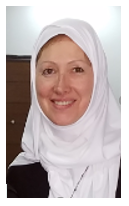What is it like to be a Muslim Faith Community Nurse in a Mosque Community?
by Nancy Romanchek BSN, RN, CHPN, MPH

My favorite description of Islam is as a clear, racing river which flows through many countries, taking on the color of the stones beneath the surface as it goes. Being a part of this racing, ebbing, everchanging flowing stream of living water is exactly what it is like, being a Muslim Faith Community Nurse in the US in the year 2021.
The summer of 2007 was the first time I set foot inside a Masjid or a Mosque. It was a little frightening quite frankly, because of all the unknowns. As a seeker, I had been privately exploring Islam for several years by this time, and my spiritual connection was stronger than ever. What I did not expect was the stretching and redefining of everything I thought I knew, that followed opening my heart to new ways of understanding the same God of Judaism and Christianity. What was surprising was that I also naturally began integrating the pieces that spoke to my heart and found myself, spiritually, on that proverbial path in the woods that diverged. Most significantly for me, was that I gained Taqwa, what Muslims refer to as God-Consciousness, and came to know with certainty that I was guided. As a seasoned Faith Community Nurse, however, I found myself landing squarely and at times awkwardly, as a faith community hybrid.
In 2009, I presented at the Westberg Symposium about starting a Mom’s Group in a Mosque Community. Some of the obstacles I had discussed at that time seem simplistic to me now. They included what may be described as an altered understanding of time that observant Muslims often possess because of the ever-present vigilance to praying the five daily prayers. Further complicated by the implementation of daylight savings time, creating an 8-month plan with guest speakers and short, self-esteem building projects for young moms was challenging. Numbers could suddenly and unexpectedly swell when grandmothers and visiting mothers-in-law visited from faraway places and were welcomed to gatherings. Including food at an event included an unspoken norm of adding, potentially, anyone else who also happened to be present in the Masjid. Carefully laid plans could be cancelled at a moment’s notice as well, by forces of change. A case in point; not unlike the Jews, Muslims bury their dead with rapidity, and there have been days when I awoke anticipating a certain plan for my day and instead found myself at a funeral prayer mourning in concert with the freshly bereaved and then carrying these raw emotions on to the cemetery to bury a friend. God is in control of our lives and our plans. All future plans are by their very essence, inshallah or only by and through the grace of God; they are “God willing.”
Practicing in a Mosque community setting has caused me to confront my own unconscious bias and intentionally pause from action to observation on many fronts leaving me to grapple with the question of whether there is a place in the Mosque Community setting for a faith community nurse? After more than a decade of self-identifying as a Muslim and alternatively leading and following health related work within the community, conducting interviews and focus groups, I strongly believe that there is. Will faith community nursing in the context of a Mosque Community look the same as in the current foundationally Christian model? I can say unequivocally and without hesitation, no. It will not.
The population demographics are different, the needs are different, the entire world view is different and because there is no central authority, each Mosque community may function differently. To remain relevant, the role of the faith community nurse must shift with the emerging needs of the Mosque Community and be redefined to become wider, deeper, and more connected to the mainstream healthcare community. To increase opportunities for success, the Muslim faith community nurse must possess an understanding of the faith practices, the world view, and nuances of ethnicity and cultural overlays within each unique Mosque community population mix and be politically savvy from a pluralistic perspective. Essentially, the Muslim FCN should still “suit up, show up; and not be attached to the results;” but also must surrender control to God, and be willing to be swept along in the clear racing river of Islam where there is palpable competition to do good, and the chaos of the countries that present in the mix, are all happy companions on the river.



